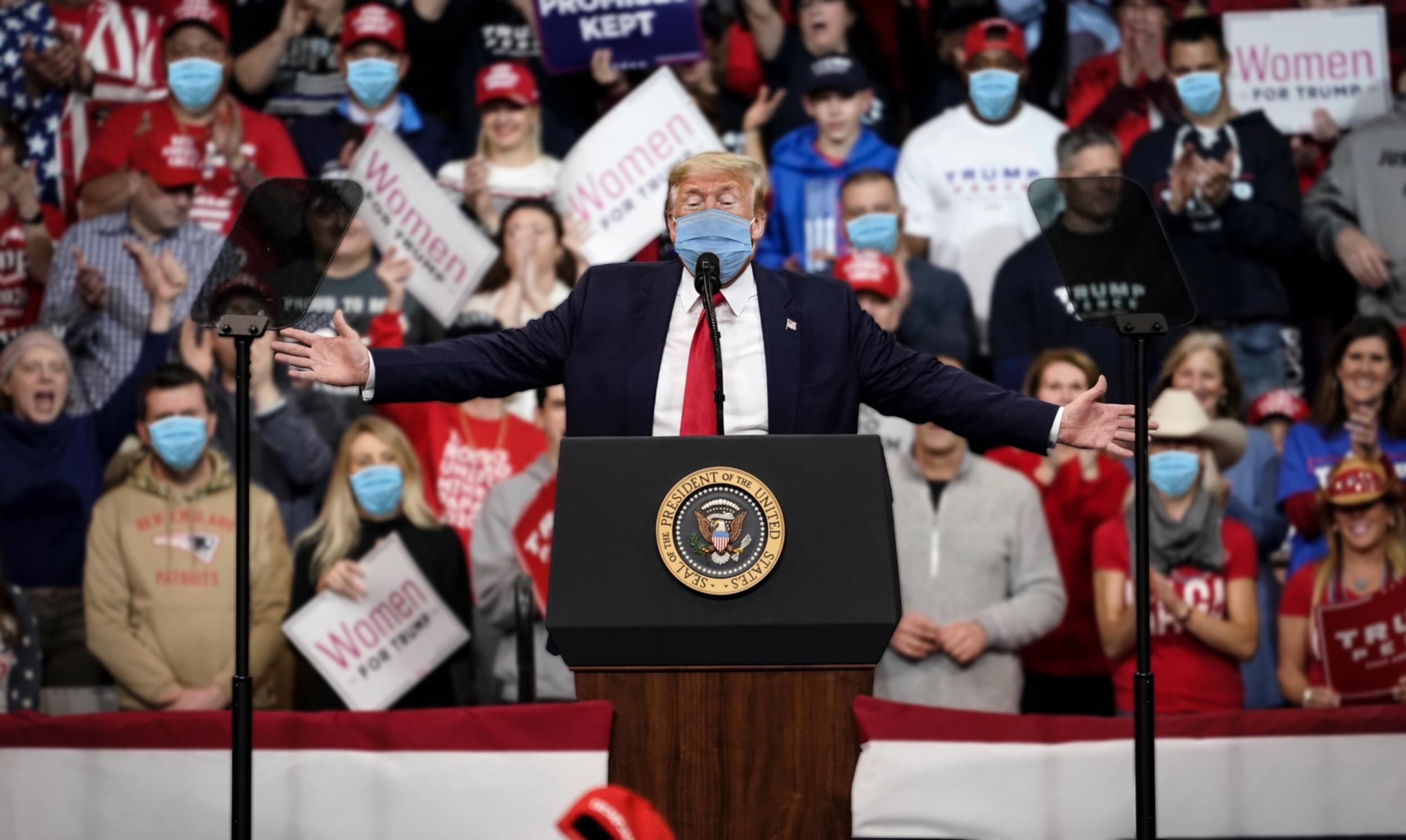Post-Pandemic America: Society to face 'unintentional consequences' from coronavirus for generations, experts say
A battle for human rights, spike in divorce rates and post-traumatic stress disorder: Here's what life may look like for Americans on the other side of the Covid-19 outbreak


The United States is reopening — whether you like it or not.
As states lift stay-at-home orders and encourage businesses to once again open their doors to the public, health officials are warning the nation is still sorely lacking in its testing and tracing capabilities. A second, potentially deadlier wave of the novel coronavirus could strike the US even harder in the fall, experts have said, as there are few measures currently in place to prevent Covid-19 from becoming another major outbreak within the country again.
More than one million people living in the US have contracted Covid-19, and over 60,000 people have died due to complications resulting from the disease. Analysts are now raising their estimates for the national death toll, citing “flatter and thus longer epidemic peaks” in various states like New York, which found itself at the heart of the crisis as it unfolded nationwide.
Donald Trump is even beginning to admit that more people will die from the virus than he previously acknowledged — even as he continues insisting the country “reopen” sooner before later, and celebrating states like Texas as they open up businesses to the public.
The country’s own health agencies are imploring states to remain locked down until they record a significant drop in cases, combined with new initiatives to expand testing abilities. Still, the US appears set to reopen in the midst of the pandemic, with questions swirling over how those vulnerable to the deadly virus can be safe as society returns to some form of normalcy.
What might that new normal look like? What can Americans expect from their state and federal governments, as well as local businesses, as they seek to reopen the country? How might their lives be impacted for decades to come due to this unprecedented moment? The Independent asked these questions and more to experts in different aspects of human interaction to get a sense of what the “new normal” will be like in a post-pandemic American society.
Post-pandemic parallels to 9/11
“We’ve all been trying to envision what our world may look like” after the pandemic, said Dr Saralyn Mark, an endocrinologist and the first senior medical adviser to the Office on Women’s Health at the US Department of Health and Human Services. “We adapt, we evolve and we respond. As a society, I believe we’ll all do that.”
Dr Mark, who spent time in Asia after the Severe Acute Respiratory Syndrome (SARS) outbreak of 2003, predicted that the US will likely take on many of the same measures societies in China and other Asian countries adopted in the wake of the deadly virus.
“Everyone began wearing face masks, especially when they were immune compromised,” she said, adding that masks were initially a “very strange” concept for people throughout Asia. The practice of wearing a face mask when sick or during seasonal outbreaks has since become commonplace in many crowded cities and suburbs across Asia, Dr Mark noted.
“Now, we’re all adapting to this new normal of seeing people walk their dogs with face masks — it’s already becoming our new normal,” she said. “I don’t see that going away anytime soon.”
Dr Mark compared the idea of wearing face masks for years to come to the “new normal” the US experienced in the wake of the terrorist attacks on September 11, 2001.
“We take it as second nature,” she said about how travel has changed since the attacks. “We undress at the airport, take off our shoes … our lives have changed and we accept it. In fact, in my perspective, I find it odd when I don’t have to take off my shoes while going through security.”
In some ways, these extra precautions have proven useful. As with Asian countries in the wake of SARS, face masks were shown to significantly reduce the rate of influenza, Dr Mark noted. In other ways, they serve as symbolic measures — “think of it as your physical red light sign”, she said.
Whether or not you're sick, a face mask “signals to people that you are taking necessary precautions” and warns people to “keep distance” between each other.
As with any crisis, Dr Mark says “we’re always going to experience an element of post traumatic stress disorder”.
“If we see someone coughing or sneezing, our hearts are going to stop,” she added. “It’s going to be hard to change that for a while. Just like seeing a [unattended] bag in public, our bodies will adapt to help protect ourselves. It may change as the generations move forward and the virus becomes potentially endemic, and then we’ll take it in stride.”
Divorce, e-dates and tense relationships
Americans can expect to see far more hesitancy in online dating and hook up culture, as well as for divorce rates to rise in the coming months when lockdown orders are lifted, according to psychotherapist and relationship expert Lisa Brateman, who told The Independent: “I’ve been in contact with some divorce lawyers who have been setting up a lot of consultation time on Zoom.
“What I’ve noticed in the last three weeks is that couples go two ways in the quarantine: some feel closer and have each other’s backs, they’re in it together and they’re more intimate because they’re sharing things they don’t have time for, and are much more present in the best of ways,” she said. “I’m also working with couples who are having a very difficult time because things that weren’t working well are now being exacerbated by being together 24/7.”
Ms Brateman said the divorce rate would likely begin ticking upwards in about three months, when people have had time to consult attorneys and remove themselves from marriages with their quarantined partners.
When it comes to dating in a post-pandemic society, Ms Bratement said that “some people might be tentative to put their toe back in the world” and that dates would look much different than they used to just months ago.
“Why would you hug someone you don’t know just because your cousin does?” she suggested about the possibly of meeting a blind date. “We’ll have a barrier in the first three to four months in who we talk to and how we touch them.”
She added: “The longer this lasts, if you’re in this crisis situation, it’s going to take even more months to get back to normal with family, forget a date.”
Though people continue to use dating apps to set up virtual dates with potential suitors, Ms Brateman predicted users will spend more time speaking with people before meeting up for casual hook ups or dates in the post-pandemic future.
“Why make the effort if it’s a coffee date just to get there when you can have that same conversation online?” she said. “People won’t just jump into having coffee or have three different dates in a single night like they used to — at least here in New York City.”
While her younger clients have told Ms Brateman they’re itching to return to normalcy, she predicted even the youngest generations will face “unintentional consequences” due to the pandemic.
“Now everyone is wearing a mask because that’s the direction. For a long time afterwards, people are going to look at others and think, ‘are they safe?’”
Human rights in jeopardy for generations
The United Nations High Commissioner for Human Rights has warned that emergency powers used during the coronavirus pandemic “should not be a weapon governments can wield to quash dissent, control the population, and even perpetuate their time in power” — as experts warn they are being used to do just that.
Human rights — and particularly, women’s rights — are facing significant attacks and rollbacks that have largely gone underreported across the country in recent months. The abortion battle has raged on despite lockdown orders, with many states imposing harsh barriers to prevent women from accessing safe reproductive health care options amid the crisis.
Conservative leaders have meanwhile justified the extreme measures and indefinite abortion bans as responses to the virus — but they are actually part of a decades long war against women’s reproductive rights, according to legal historian Mary Ziegler.
“The states banning abortions during the pandemic are the states that wanted to ban or restrict abortions before the pandemic, so any idea that this is about personal protective equipment (PPE) or anything else seems pretty far-fetched,” she said. “Even the strategy that states are using to justify the bans that they’ve now taken before the federal courts and probably will take before the Supreme Court is also the same.”
Ms Ziegler noted how states pivoted from focusing on a “right to life” argument to instead honing in on local issues impacting reproductive rights well before the pandemic. States like Texas have now used those examples to implement restrictions on abortion access based on an apparent need for personal protective equipment. Of course, at-home abortions do not require PPE, as Ms Ziegler noted, calling other claims surrounding the restrictions “bogus”.

“They’re claiming the states need deference in times of emergency. Minus the emergency part, that’s very much the same strategy used to undo” Roe vs Wade, she said.
If the Supreme Court decides that states should in fact be provided such deference in the middle of an emergency, Ms Ziegler said there’s no telling when or how a line can be drawn preventing lawmakers from further encroaching on human and civil rights.
“There would be nothing to stop states from declaring their own emergencies, even when most people thought there was nothing wrong,” she said. “If you’re deferring to states on what to do during an emergency, do you defer to states to determine if there is an emergency? … It’s very reminiscent of some of the questions asked during the war on terror.”
She added: “It’s hard for me to imagine, for example, Texas restricting free speech or taking guns away until the end of the pandemic.”
Ms Ziegler also predicted this year will shape the US court system for generations, with a potential adverse impact on human rights depending on the outcome of the 2020 elections.
“I think people have underestimated how much 2020 will shape the courts,” she said. “If you have another Trump term, you almost certainly will be replacing Ruth Bader Ginsburg and potentially Stephen Breyer with very conservative judges. There would be no swing vote.”
Join our commenting forum
Join thought-provoking conversations, follow other Independent readers and see their replies
Comments
Bookmark popover
Removed from bookmarks